- Home
- Michael Byrnes
The Sacred Blood Page 16
The Sacred Blood Read online
Page 16
Donovan looked over his shoulder and waited for the nun to disappear from the room. Then he looked to Charlotte for any sign of disagreement. She nodded for him to continue. “Earlier this year, I was given a book,” he explained. “A very, very old book . . .”
33
******
Egypt
Next to a keypad on the door frame, Rabbi Aaron Cohen pressed his thumb on a small glass pane. Within seconds, the biometric “key” was accepted and the keypad illuminated. Next he punched in the twelve-digit password, each keystroke emitting a tiny digital chirp. The panel flashed three times, then a series of mechanized bolts slid out from around the door frame. The massive door disengaged, automatically opening inward on smooth hydraulic pistons. A motion sensor turned on the crisp LED lights in the space beyond.
On the right side of the door, Cohen placed his fingers over a slim golden mezuzah case angled toward the open door and inscribed with the Hebrew letter shin (w), representing one of God’s Old Testament names, Shaddai.
Stepping across the threshold, the rabbi paused at the beginning of what resembled a mine tunnel. He vividly recalled the claustrophobia he’d felt when he was first introduced to this place by the Levite priests.
The year was 1974—a time of both great tragedy and personal transformation . . .
Aaron had just celebrated his twentieth birthday and had been in the second term of his junior year at New York’s Yeshiva University. It was a snowy afternoon in late January when he received the portentous call from his oldest sister, Ilana. “Father is dead” were the first words she’d said, in an eerily clinical fashion (at the time, she’d been an RN at Beth Israel). As shock had chilled over him, she’d gone on to explain in certain terms that earlier that fateful morning, the B41 bus slid on ice through a Flatbush Avenue intersection and plowed over three pedestrians caught in the crosswalk, injuring one critically, two mortally—including Mordecai Cohen.
“A father should never outlive his son,” Grandfather had said, weeping for the first time Aaron could recall. Not until his son had been put into the ground had the old man stopped rending his garments and chanting, “Baruch dayan ha-emet”—“Blessed is the Judge of truth.”
Following the prompt burial and compulsory seven-day shiva, Grandfather had summoned Aaron to his office and, without a word, handed him a first-class ticket to Cairo. When Aaron had asked him what it was for, Grandfather cryptically replied, “It is up to you now, my honorable grandson. Your future awaits. The fate of Zion rests with you.” Instructions had been provided, along with what would prove to be Grandfather’s last pearls of wisdom. Aaron would later learn that Grandfather had died in his sleep as his plane departed for Egypt.
When his flight arrived at Cairo International’s terminal, young Cohen was greeted outside customs by a white-robed Egyptian with crooked teeth and a horribly pockmarked complexion partially camouflaged by a patchy beard. The man discreetly presented a dolphin-and-trident talisman before asking Aaron to do the same. The Egyptian then escorted him to a beat-up pickup truck and insisted on blindfolding him for the ride to the warehouse—a scary episode for a young Jew in a hostile, foreign land less than a year after the Yom Kippur War.
The first thing he recalled about the warehouse was its grimy odor. When the blindfold finally came off and he found himself in the back office of a huge garage surrounded by a group of similarly dressed Egyptians, confusion and anxiety racked his thoughts. He remembered wondering how this place could possibly be the sacred ground Grandfather had spoken of.
“Sorry for this,” one of the men said, dangling the blindfold. “I’m sure you understand that precautions are necessary.”
Though Grandfather had told Aaron that the Diaspora had scattered the bloodline all over the world, he’d been nonetheless taken aback when he first saw the Egyptian man’s dark skin. Later in life he’d recall the episode when he learned that 99.9 percent of the human genome was identical, despite any outside appearances. The priest’s amazing aquamarine eyes and the gleaming silver talisman hanging over his heart on the front of his white tunic, however, further confirmed a distant yet distinct familial bond.
“You look just like your father, Mr. Aaron. A bit taller, perhaps. He was a very, very good man. God’s light will shine perpetually upon him.” The man’s English was nearly perfect. “My name is Khaleel.” He’d offered a warm handshake. “It is an honor to have you here.”
Aaron was speechless, though Khaleel’s kind words had eased his anxiety. He watched as one of the men worked on opening a door built into the floor.
“I trust your trip was comfortable?”
“Yes, sir.”
“Please, Aaron, call me Khaleel.”
His tone was remarkably calm. Aaron nodded.
Khaleel grinned. “Well then, come. Let us begin,” he said, pointing to the dark opening. “We have so much to discuss.”
In the cramped, dank basement, Khaleel had unlocked a crude, dented metal door with a skeleton key. Its hinges groaned grittily when he opened it. On the other side, he groped for a light switch that brought to life a string of work lights dangling along the center of a tunnel. “Not great,” he admitted, looking up at the dull bulbs, “but it’s a huge improvement over the torches we’d been using up until the twentieth century.”
That managed to bring forth Aaron’s first smile. Khaleel, he’d quickly determined, was a gentle, wise man.
Aaron watched the Egyptian swing the creaking door back into place, his long fingers turning the dead bolt. Realizing he’d been locked in an obscure pit in the Egyptian no-man’s-land, he felt his hands begin trembling. He stuffed them into his pockets. Grandfather wouldn’t have liked it, but even God would have trouble seeing his hands (or his head) down here.
Khaleel placed his right hand on Aaron’s shoulder and extended his left invitingly down the tunnel. “It may not look like much, but what it leads to is very special. Come.”
They walked abreast, the tunnel just wide enough to accommodate them.
Aaron flinched when he saw a scorpion darting along the earthen floor. Khaleel, however, paid it no mind as it skittered over his sandal.
“Your grandfather has told me you’ve learned quite a lot. ‘An excellent student,’ he says.”
“I know it is very important to study our history,” Aaron replied.
“Our history is the doorway to our future,” Khaleel agreed. “You have read about Onias and the tell?”
“Yes, sir ...I mean, Khaleel.”
To calm his anxiety, Aaron told him what he’d learned from reading Josephus’s detailed accounts in The Jewish War. In the second century b.c.e., Onias had been the high priest at the Jerusalem temple. He’d vehemently opposed the pagan sacrifices being allowed on Yahweh’s sacred altar. The temple had been poisoned by Hellenic culture—defiled. When the Syrian king Antiochus threatened war against the Jews, Onias fled to Alexandria to seek refuge under Ptolemy (who detested Antiochus). Onias was granted this land in what had then been the nome of Heliopolis. And here Onias had constructed a fortress city atop a man-made mound. Upon its highest point, he’d built a new sanctuary—a new temple to God, modeled after the one in Jerusalem, but on a smaller scale, and free from any pagan influences.
“It happened just as Isaiah prophesied,” Khaleel added. “The prophet told us that in a place called the City of the Sun, the language of Canaan would be spoken in the land of Egypt, and an altar to the Lord would rise up. And just as Isaiah had said, here is where the Savior came to begin His mission to rescue the Israelites.”
They walked further down the passage in silence. Halfway down the tunnel, they turned along a slight bend. The lighting remained dim, so Aaron could barely make out what lay at the tunnel’s terminus—a rectangular outline of some kind.
“You know what happened to Onias’s temple, yes?” Khaleel asked, testing him.
“The Romans burned it down. Not long after they destroyed the Jerusalem temple in seventy c.e.�
�� Josephus, Aaron recalled, had been very explicit about that too. “The Romans were looking to destroy any hope of another Jewish rebellion. Not only was Onias a priest, but he had his own army here in Heliopolis. The Romans considered this the last Jewish stronghold—a rallying point for further sedition.”
“Excellent, young Aaron,” Khaleel said. “And since the days of Onias, time and nature have colluded without hindrance to reclaim what little remains of his grand temple city. Up there”—he pointed through the five meters of earth that hovered overhead—“we’re left with only ravaged foundations. But down here, Onias’s real legacy has been preserved. Are you ready to learn about it so that you may truly become a Son of Light?” “Yes.”
“Are you ready to see it? To see what Onias’s army was protecting?” See it? “I ...I think so.” When he looked into Khaleel’s eyes, he experienced the same rush he’d felt when his father was about to bring him into Grandfather’s secret room—two men embarking on a journey. “You cannot be a Kohen without first going to Egypt,” Grandfather had told him. “There, everything you have learned will become clear.”
Khaleel’s voice suddenly dropped low. “Did your grandfather also tell you that Yeshua walked down this very same tunnel?”
This shocked Aaron. “Jesus?”
“That is right. As Isaiah foretold, the Savior came here, just as you have. To le a r n. To u nder s t a nd . To b e l ie ve.”
They stopped at the intimidating steel door that materialized from the shadows.
As Khaleel worked a second key into its lock, he said, “And inside this room, Jesus was given God’s most wondrous gift.”
I am a Son of Light, Cohen thought.
The earthen walls looked the same now as they had in 1974, with the exception of some steel reinforcement beams recently retrofitted along some of the crumbling ancient stone arches, and the electrical conduit that snaked between the modern overhead light fixtures.
Five meters below the surface, the subterranean passage ran a perfect line stretching two hundred meters to a secret chamber beneath Tel elYahudiyeh’s foundation. The dusty parcel situated directly above it attracted little attention, but it hosted the faint remains of a massive elliptical fortification built by the Hyksos in the seventeenth century b.c.e.; like the mound, the site was protected by the Egyptian Supreme Council of Antiquities. Therefore, excavations required SCA authorization—virtually impossible to attain. The last meaningful excavation performed here had been in 1906 by Flinders Petrie (the incriminating findings were published in Hyksos and Israelite Cities)—and luckily, even though the renowned father of modern archaeology had pinpointed this as the city of Onias, he had not been granted permission to dig below the tell’s foundation.
At the tunnel’s terminus, the rabbi stopped in front of the second security door, which looked nothing like the one Khaleel had trusted to a simple lock and key. Unlike the tunnel and its improved entrance door, here Cohen had insisted upon major modifications. Regularly, new safeguards and enhancements were added to keep pace with ever-improving technology.
Cohen pressed his thumb on the lock’s scanner, then keyed in a second password. The panel flashed blue three times. The steel door’s mechanical guts came to life, multiple jamb bolts smoothly disengaging. The pressure seal released a small pop just before the door began opening along a smooth arc. Beyond, a dense matrix of iridescent green lasers snapped off.
Cohen entered the cube-shaped vault.
Stainless steel panels sheathed steel-reinforced zero-slump concrete slabs (with special additives that made their crush value ten times greater). Behind that, the two-meter-thick ancient block walls constructed by Onias’s builders had been maintained.
Cohen stared in wonderment at the supervault’s extraordinary centerpiece.
Less than a minute later seven priests in white tunics funneled through the entry and awaited instructions.
34
******
Jerusalem
Amit and Jules entered the Old City’s southern wall through the Zion Gate. They kept close to the stone sidewalls to avoid the cars negotiating the tight L-shaped bend in the tunnel.
“So exactly where are we going?” Jules asked in a loud voice. Amit had been tight-lipped as he parked the Land Rover in the tourist lot outside the gate. Contemplating a plan, she intuited.
Amit didn’t want to compete with the sounds of tire rubber squealing along the glass-smooth ancient paving stones. So he provided the answer only once they’d emerged into the Armenian Quarter along busy Shaar Tsiyon, lined with cafés and souvenir shops.
“We are going to the Jewish Quarter,” he told her.
Passing through a security checkpoint and metal detectors at the entrance to the Jewish Quarter, Amit only hoped that their sly pursuer wouldn’t be able to circumvent the metal detectors. A Mossad agent like Enoch could easily bypass security barriers. The agency’s outside contractors, however, didn’t have that luxury.
He brought Jules through the Roman Cardo, down through Hurva Square (where the only people she spotted were Hasidim), and through the narrow maze of streets that put them on Misgav Ladach. Finally, he stopped in front of a nondescript three-story building neatly edged in Jerusalem stone. A bronze placard engraved in Hebrew and English with the temple society hung above the unassuming entry, which seemed little more than a storefront.
“Here?” she asked, looking up at the sign. “What are we doing here?” “Rabbi Cohen’s office,” he flatly replied, thumbing at the door. “I figured we might ask him if the scrolls were still in Yosi’s office when he met with him yesterday. If the scrolls had been moved, he might know it.”
“That’s your plan?”
Exactly the reaction he’d expected. “Got anything better?” She put her hands on her hips and huffed. “Yikes. We are screwed.” “To be determined,” he optimistically replied. He reached out and
pulled the door open. “After you, mademoiselle.”
“Rrrr,” she growled as she walked past him.
They entered the reception foyer, whose walls were covered in Torahthemed scenes that would have impressed Michelangelo himself: Moses raising his staff to part the seas; Moses atop Sinai; Moses presenting God’s sacred commandments to the Israelites. A massive gold-plated menorah rose tall behind a reception desk. Seated directly beneath it was a middleaged woman wearing an ultraconservative navy blouse buttoned to the collar. Like that of many Hasidic women, her thick, wavy hair was a wig.
“ Shalom aleichem,” Amit greeted her.
She responded in kind, then asked, “May I help you?”
“Yes, I’ve come to speak with Rabbi Cohen,” Amit replied. This seemed to confuse her. “Sorry, but my husband is out of the country on business. Did you have an appointment with him?”
“Not exactly,” Amit said, his optimism immediately deflated.
“Perhaps I might be of assistance then?” she pried. “What is it you’d like to speak with him about?”
“Well . . . ,” he sighed. “W hen do you expect him back from . . . ? ” Amit let the words linger, hoping she’d fill in the blank. Surprisingly, she did.
“I expect him to return from Egypt this evening.”
“Cairo, was it?” Amit pressed.
That’s when Cohen’s wife realized that she’d already said too much. “If you’d like to leave your name, telephone number . . . I’ll certainly see that it gets to him.”
“That’s okay. I’m sure I’ll see him at the Rockefeller Museum. It’s nothing urgent.”
“Your name?”
Amit wasn’t about to give his own. “If you could tell him Yosi stopped by?”
“Certainly.”
“We came to see the museum as well,” Jules tactfully cut in, as if reminding Amit. She pointed to a sign above a door to Mt. Sinai’s left side— an arrow next to the word museum.
“That’s right,” Amit quickly agreed. “I heard you’ve recently remodeled the galleries?” He could tell this ligh
tened Mrs. Cohen’s mood.
“We just reopened two weeks ago.”
“Then two tickets, please,” he cheerily replied, reaching for his wallet.
35
******
The spacious gallery was bustling with tourists, many of whom, Amit could tell, were American Jews eager to decipher their heritage. “Do we really have time for this?” he protested.
“Do you really want to draw more suspicion to yourself ?” Jules quickly rebutted. “Why didn’t you just go ahead and wrestle the woman? Besides, we might learn something here. And it’s certainly safer than walking the streets.”
In the main exhibit hall, the walls were covered in wonderfully detailed oil paintings—a virtual storyboard going back to 1300 b.c.e. to trace Moses and the Israelites along their grueling trek out of Egypt, through the forty-year desert pilgrimage and the centuries-long Canaan wars, to King David’s conquest of Jebus in 1000 b.c.e.—the capital city he’d renamed “Jerusalem”—and Solomon’s construction of the first temple shortly thereafter.
In a separate room, the Babylonian invasion and subsequent exile of the Jews was recounted on twelve framed canvases, and over three dozen more bridged the Jewish dynasties and occupying empires leading up to Rome and its destruction of Herod’s temple in 70 c.e. A large display table in the room’s center sat beneath a sign reading, in English and Hebrew, the third temple. Encased in a Plexiglas cube was an elaborate architectural model showing the Temple Society’s vision for a new Temple Mount, absent all Islamic buildings currently on the site, including the Dome of the Rock and al-Aqsa Mosque.

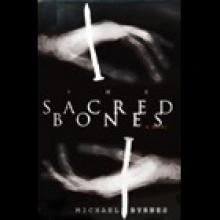 The Sacred Bones
The Sacred Bones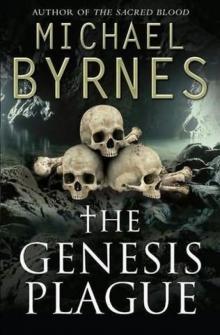 The Genesis Plague (2010)
The Genesis Plague (2010)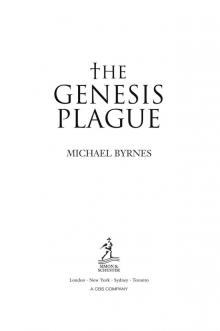 The Genesis Plague
The Genesis Plague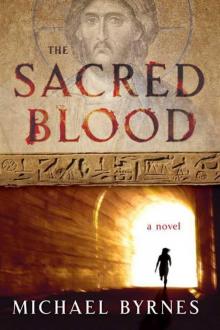 The Sacred Blood
The Sacred Blood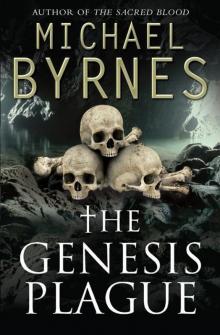 The Genesis Plague tf-1
The Genesis Plague tf-1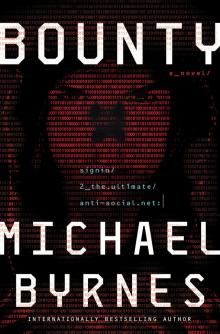 Bounty
Bounty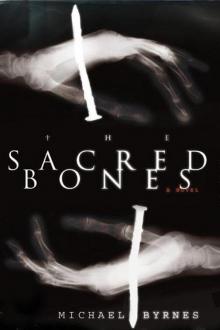 Sacred Bones : A Novel
Sacred Bones : A Novel